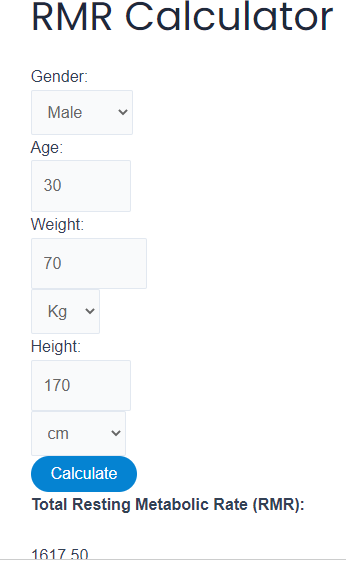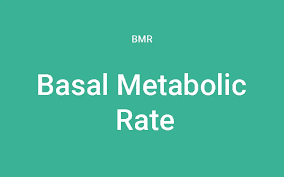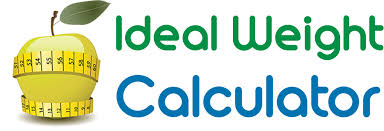Embark on your journey towards optimal health and fitness with the help of a powerful tool RMR calculator (Resting metabolism calculator). This innovative calculator are designed to provide you with personalized insights into your body’s energy requirements, empowering you to create a tailored plan for weight management, muscle growth, and overall well-being. Experience the benefits of this innovative tool to unlock the potential of your metabolism and achieve lasting success on your health journey.
RMR Calculator
[ez-toc]
What is RMR?
Are you on a journey to better understand your body and its functions? One term you might have come across is RMR or Resting Metabolic Rate. But what exactly does it mean, and how does it affect your overall health and well-being? In this article, we'll delve deep into the science behind RMR, its role in weight management, and how you can optimize it for a healthier lifestyle.
Defining RMR: The Basics
Resting Metabolic Rate (RMR) is the amount of energy your body expends while at rest, which means it's the number of calories you burn while doing nothing. It represents the baseline energy requirement needed to maintain essential body functions such as breathing, circulation, and cell production. RMR accounts for about 60-75% of your total daily energy expenditure, making it a crucial factor in maintaining a healthy weight.
RMR and Weight Management
Understanding your RMR is crucial for weight management, as it helps you determine how many calories you need to maintain, lose, or gain weight. To maintain your current weight, you must consume the same number of calories your body burns daily, including your RMR and the calories burned through physical activity. To lose weight, you'll need to create a calorie deficit by consuming fewer calories than your body burns, while gaining weight requires a calorie surplus.
How to Measure Your RMR
There are several methods to estimate your RMR, including:
- Online calculators: Numerous websites provide RMR estimation based on factors like age, gender, weight, and height. Keep in mind that these calculators provide a rough estimate and may not be 100% accurate.
- Indirect calorimetry: This non-invasive method measures the oxygen you consume and the carbon dioxide you produce to determine your RMR accurately. It's typically conducted in a clinical setting.
Tips to Optimize Your RMR
To optimize your RMR for a healthier lifestyle, consider the following:
- Build muscle mass: Engage in regular strength training exercises to increase your muscle mass, which can help boost your RMR.
- Prioritize sleep: Aim for 7-9 hours of sleep per night, as sleep deprivation can negatively impact your RMR.
- Stay hydrated: Proper hydration is essential for maintaining a healthy metabolism.
- Eat a balanced diet: Ensure your diet includes a mix of proteins, fats, and carbohydrates to support optimal metabolic function.
What Can Affect Resting Metabolism Rate (RMR)?
Your Resting Metabolism Rate (RMR) plays a critical role in your overall health and weight management efforts. But did you know that various factors can influence your RMR? Understanding these factors is essential for optimizing your metabolism and achieving your fitness goals. In this article, we'll explore the main factors affecting RMR and offer tips on how to address them for a healthier lifestyle.
Age: The Inevitable Factor
As you age, your RMR gradually decreases. This decline results primarily from a loss of muscle mass and an increase in fat mass as you grow older. To counteract the effects of aging on your RMR, incorporate strength training exercises into your fitness routine to maintain and build muscle mass.
Gender: The Battle of the Sexes
Men and women have different RMRs due to differences in body composition. Men generally have a higher RMR than women, as they tend to have more muscle mass and lower body fat percentages. Women can boost their RMR by focusing on building lean muscle through regular strength training exercises.
Body Composition: Muscle vs. Fat
Your body composition, specifically the ratio of muscle mass to fat mass, is a significant determinant of your RMR. Muscle tissue is more metabolically active than fat, meaning it burns more calories at rest. By increasing your muscle mass through strength training, you can raise your RMR and support weight management efforts.
Genetics: The Role of Heredity
Genetics plays a part in determining your RMR, as some people are naturally predisposed to having a faster or slower metabolism. While you can't change your genetic makeup, you can still focus on optimizing other factors, like body composition and lifestyle habits, to improve your RMR.
Hormones: The Balancing Act
Hormones, such as thyroid hormones and cortisol, can have a significant impact on your RMR. An underactive thyroid or high cortisol levels due to stress can lower your RMR, making it harder to maintain or lose weight. Consult with your healthcare provider if you suspect a hormonal imbalance that might be affecting your RMR.
Environmental Factors: Temperature and RMR
Extreme temperatures can temporarily affect your RMR as your body works to maintain its ideal internal temperature. In colder environments, your body burns more calories to stay warm, while hot temperatures can also increase RMR due to increased sweating and heart rate. While not a primary factor, it's essential to be aware of environmental impacts on RMR.
Nutritional Factors: Fueling Your Metabolism
The types of foods you consume and your overall diet can influence your RMR. Consuming a well-balanced diet rich in protein, healthy fats, and complex carbohydrates can support optimal metabolic function. Additionally, avoiding crash diets or extreme caloric restrictions can prevent your body from entering "starvation mode," which can lead to a decreased RMR.
Understanding the factors that affect your Resting Metabolism Rate is crucial for managing your weight and maintaining a healthy lifestyle. By addressing these factors through strength training, proper nutrition, and hormone management, you can optimize your RMR and reach your health and fitness goals. Take control of your metabolism by understanding the factors that influence your RMR and making informed decisions about your diet and exercise regimen.
What RMR Indicates?
Your Resting Metabolic Rate (RMR) is more than just a number. It provides valuable information about your body's energy requirements, overall health, and fitness level. In this article, we'll explore what your RMR indicates and how to use this knowledge to optimize your weight management efforts and achieve a healthier lifestyle.
RMR and Energy Requirements
Your RMR represents the number of calories your body needs to maintain essential functions like breathing, circulation, and cell production while at rest. By understanding your RMR, you can determine your daily caloric needs to maintain, lose, or gain weight. Keep in mind that your RMR is just a part of the total energy expenditure, which also includes physical activity and the thermic effect of food.
RMR and Body Composition
A higher RMR typically indicates a higher muscle mass, as muscle tissue is more metabolically active than fat. By analyzing your RMR in conjunction with body composition measurements, you can gain insights into your overall fitness level and develop strategies to optimize your muscle-to-fat ratio.
RMR and Metabolic Health
Your RMR can provide clues about your metabolic health. A significantly lower-than-expected RMR may indicate an underactive thyroid, while a higher RMR could be a sign of an overactive thyroid. If you suspect that your RMR is not within the normal range for your age, gender, and body composition, consult with a healthcare professional to rule out any underlying issues.
RMR and Weight Management
Knowing your RMR is essential for effective weight management. By understanding the number of calories your body requires at rest, you can create an appropriate caloric deficit or surplus to lose or gain weight. Monitoring your RMR regularly can help you adjust your diet and exercise plan as your body composition and fitness level change over time.
RMR and Lifestyle Factors
Your RMR can also serve as a reflection of your lifestyle choices. Factors such as sleep, hydration, and stress levels can impact your RMR, providing insights into areas where you may need to make adjustments. By optimizing your sleep, nutrition, and stress management, you can support a healthier RMR and overall well-being.
Your Resting Metabolic Rate is a valuable tool that can provide insights into your overall health, fitness, and weight management journey. By understanding what your RMR indicates and how to optimize it, you can make informed decisions about your diet and exercise regimen, leading to a healthier and more balanced lifestyle. Unlock the power of your RMR and use it to guide your health and fitness journey for better results and long-term success.
Why Calculating RMR Is Important?
Your Resting Metabolic Rate (RMR) plays a vital role in your health and fitness journey. But why is calculating your RMR so important? In this article, we'll explore the significance of RMR, its impact on weight management, and how it can help you make informed decisions about your diet and exercise regimen for better overall health and well-being.
- Personalized Caloric Needs
Calculating your RMR is essential for determining your personalized daily caloric needs. Knowing how many calories your body requires at rest helps you create a balanced diet plan that aligns with your weight management goals. By consuming the right number of calories, you can maintain, lose, or gain weight more effectively.
- Optimizing Body Composition
Understanding your RMR can provide insights into your body composition, as higher RMRs are often associated with higher muscle mass. By knowing your RMR and tracking it over time, you can make informed decisions about your exercise routine, specifically regarding strength training, to optimize your muscle-to-fat ratio and support a healthy metabolism.
- Monitoring Metabolic Health
Calculating your RMR can serve as an essential tool for monitoring your metabolic health. An unusually low or high RMR may be indicative of underlying health issues, such as thyroid imbalances. Regularly tracking your RMR allows you to identify any potential concerns early and seek professional advice when necessary.
- Adapting to Changes
As you age, your body composition and fitness level change, which can impact your RMR. Regularly calculating your RMR enables you to adapt your diet and exercise plan to these changes, ensuring that you continue to meet your health and fitness goals.
- Evaluating Lifestyle Choices
Your RMR can provide valuable insights into how your lifestyle choices, such as sleep, stress, and hydration, are affecting your metabolism. By monitoring your RMR and addressing any lifestyle factors that may be impacting it, you can support a healthier metabolic rate and overall well-being.
- Motivation and Accountability
Calculating your RMR can serve as a source of motivation and accountability on your health and fitness journey. Tracking your RMR and seeing improvements over time can be a powerful motivator to continue making positive changes in your diet and exercise regimen.
Calculating your Resting Metabolic Rate is crucial for personalizing your health and fitness plan, optimizing your body composition, monitoring your metabolic health, and adapting to changes in your body. By understanding the importance of RMR and utilizing it to guide your decisions, you can achieve better results and long-term success on your health and fitness journey. Embrace the power of RMR and unlock its potential for a healthier, more balanced lifestyle.
How Do I Calculate My RMR?
Your Resting Metabolic Rate (RMR) is a key factor in understanding your body's energy requirements and managing your weight effectively. But how do you calculate your RMR? In this article, we'll explore various methods to estimate your RMR and provide tips on how to use this information for better overall health and fitness.
Online RMR Calculator
One of the most accessible and straightforward methods to estimate your RMR is by using an online calculator. These calculators use algorithms based on factors like age, gender, height, and weight to provide an approximate RMR value. Keep in mind that these tools only offer a rough estimate and may not be 100% accurate for every individual.
Examples of popular RMR formulas used in online calculators include:
- Mifflin-St Jeor Equation
- Harris-Benedict Equation
- Katch-McArdle Equation
Indirect Calorimetry
Indirect calorimetry is a more accurate method of measuring your RMR. This non-invasive technique measures the amount of oxygen you consume and the carbon dioxide you produce to calculate your RMR. Indirect calorimetry is typically conducted in a clinical setting or specialized fitness facility.
Using RMR to Determine Total Daily Energy Expenditure (TDEE)
Once you have calculated your RMR, you can use it to determine your Total Daily Energy Expenditure (TDEE). TDEE takes into account not only your RMR but also the calories burned through physical activity and the thermic effect of food. To estimate your TDEE, multiply your RMR by an activity factor based on your typical daily activity level:
- Sedentary: RMR x 1.2
- Lightly active: RMR x 1.375
- Moderately active: RMR x 1.55
- Very active: RMR x 1.725
- Extremely active: RMR x 1.9
RMR and Weight Management
Understanding your RMR and TDEE is crucial for creating a personalized weight management plan. To maintain your current weight, consume the same number of calories as your TDEE. To lose weight, create a calorie deficit by consuming fewer calories than your TDEE, while gaining weight requires a calorie surplus.
Tips for Accurate RMR Calculation
To ensure the most accurate RMR calculation, consider the following tips:
- Use a reliable RMR calculator or opt for indirect calorimetry for a more precise measurement.
- Update your RMR calculation regularly, as factors like weight loss, muscle gain, and aging can impact your RMR.
- Consult with a healthcare professional or registered dietitian if you're unsure about the accuracy of your RMR or need personalized guidance on using this information.
Calculating your Resting Metabolic Rate is a vital step in understanding your body's energy requirements and creating a personalized health and fitness plan. By using online RMR calculators, indirect calorimetry, and incorporating your RMR into your weight management strategy, you can achieve better results and long-term success on your health and fitness journey. Start calculating your RMR today and unlock its potential for a healthier, more balanced lifestyle.
RMR Calculator for weight loss
An RMR calculator can be a game-changer when it comes to achieving your weight loss goals. By understanding your Resting Metabolic Rate (RMR), you can create a personalized plan to optimize your metabolism and maximize weight loss results. In this article, we'll discuss the benefits of using an RMR calculator, popular RMR formulas, and tips for optimizing your RMR for weight loss success.
Benefits of Using an Resting Metabolism Calculator for Weight Loss
An RMR calculator offers several benefits for individuals looking to lose weight:
- Personalized calorie targets: Knowing your RMR allows you to determine your daily caloric needs and create a calorie deficit for weight loss.
- Better understanding of body composition: RMR can provide insights into your muscle-to-fat ratio, helping you make informed decisions about your exercise routine.
- Monitoring progress: Tracking your RMR over time can help you gauge the effectiveness of your weight loss plan and make necessary adjustments.
Popular RMR Formulas
There are several RMR formulas used in online calculator, with varying degrees of accuracy. Some of the most popular formulas include:
- Mifflin-St Jeor Equation: Known for its accuracy, this equation takes into account age, gender, height, and weight.
- Harris-Benedict Equation: An older but still widely used formula, it also considers age, gender, height, and weight.
- Katch-McArdle Equation: Ideal for those with a known body fat percentage, this formula is particularly useful for athletes or those with a significant amount of muscle mass.
Creating a Calorie Deficit for Weight Loss
Once you have determined your RMR, you can use it to calculate your Total Daily Energy Expenditure (TDEE), which includes calories burned through physical activity and the thermic effect of food. To create a calorie deficit and promote weight loss, consume fewer calories than your TDEE. A general guideline is to create a deficit of 500-1000 calories per day, resulting in a weight loss of 1-2 pounds per week.
Tips for Optimizing RMR for Weight Loss
Here are some tips to help you optimize your RMR for weight loss success:
- Focus on building lean muscle mass: Since muscle is more metabolically active than fat, increasing your muscle mass can raise your RMR and support weight loss efforts. Incorporate strength training exercises into your fitness routine.
- Consume a balanced diet: Eating a diet rich in protein, healthy fats, and complex carbohydrates can help support a healthy metabolism. Avoid crash diets or extreme caloric restrictions, as they can lower your RMR and make weight loss more challenging.
- Manage stress and get enough sleep: High stress levels and lack of sleep can negatively impact your RMR. Practice stress management techniques and prioritize getting 7-9 hours of sleep per night to support a healthy metabolism.
Using an RMR calculator for weight loss can provide you with personalized insights and guidance to help you achieve your goals. By understanding your RMR and incorporating this knowledge into your weight loss plan, you can create a more effective strategy for long-term success. Embrace the power of RMR calculation and unlock its potential for a healthier, more balanced weight loss journey.

Frequently Asked Questions (FAQ)
1. What is RMR (Resting Metabolism)?
RMR, or Resting Metabolism, is the number of calories your body needs to maintain basic physiological functions at rest, such as breathing, cell repair, and maintaining body temperature. It represents the minimum energy required for your body to function.
2. Why is Knowing Your RMR Important?
Knowing your RMR is essential because it provides a baseline for understanding your daily caloric needs. It helps with weight management, designing personalized nutrition plans, and achieving fitness goals.
3. What Factors Influence RMR?
Several factors influence RMR, including age, gender, body composition (lean muscle mass), genetics, and overall health. Lean muscle tissue typically burns more calories at rest than fat tissue.
4. How Can I Calculate My RMR?
You can calculate your RMR using a Resting Metabolism Calculator. These calculators use equations like the Harris-Benedict equation or the Mifflin-St Jeor equation, which take into account your age, gender, weight, and height to estimate your RMR.
5. What is the Resting Metabolism Calculator?
A Resting Metabolism Calculator is a digital tool designed to estimate your RMR based on the information you provide. It offers a convenient way to determine your baseline calorie needs.
6. How Accurate Are Resting Metabolism Calculator?
While Resting Metabolism Calculators provide estimates, they can be reasonably accurate for most people. However, individual variations exist, so it's important to view the result as a starting point and adjust based on real-world observations.
7. What Can I Do with My RMR Information?
With your RMR information, you can calculate your Total Daily Energy Expenditure (TDEE) by factoring in your activity level. This helps you determine your daily caloric needs for weight maintenance, gain, or loss.
8. How Can I Use My RMR for Weight Management?
Understanding your RMR allows you to create a calorie deficit or surplus to achieve your weight goals. For weight loss, you can consume fewer calories than your TDEE, and for weight gain, you can consume more.
9. Can RMR Change Over Time?
Yes, RMR can change due to factors like aging, changes in body composition, or metabolic conditions. Regularly monitoring your RMR can help you adjust your nutrition and exercise plans accordingly.
10. Is a Resting Metabolism Calculator Suitable for Everyone?
Resting Metabolism Calculators are suitable for most individuals but may not be as accurate for those with unique health conditions or metabolic disorders. In such cases, consulting a healthcare provider or registered dietitian is advisable.
11. Can I Use My RMR to Create a Healthy Diet Plan?
Yes, knowing your RMR is an excellent starting point for creating a personalized and healthy diet plan. It helps you determine the appropriate calorie intake and macronutrient distribution for your goals.
12. How Often Should I Calculate My RMR?
You can calculate your RMR periodically, especially when your lifestyle, activity level, or body composition changes. It's a useful tool for adjusting your nutrition and fitness plans as needed.
13. Can I Use a Resting Metabolism Calculator to Lose Weight Safely?
Yes, Resting Metabolism Calculators can help you establish a safe and effective calorie deficit for weight loss. However, it's crucial to combine this information with a balanced diet and regular physical activity for optimal results.
Conclusion:
A resting metabolism calculator can provide valuable insights and guidance for optimizing your health and fitness journey. By understanding your body's energy requirements and incorporating this knowledge into your diet and exercise plan, you can achieve better results and long-term success. Embrace the power of resting metabolism calculation and unlock its potential for a healthier, more balanced lifestyle.





